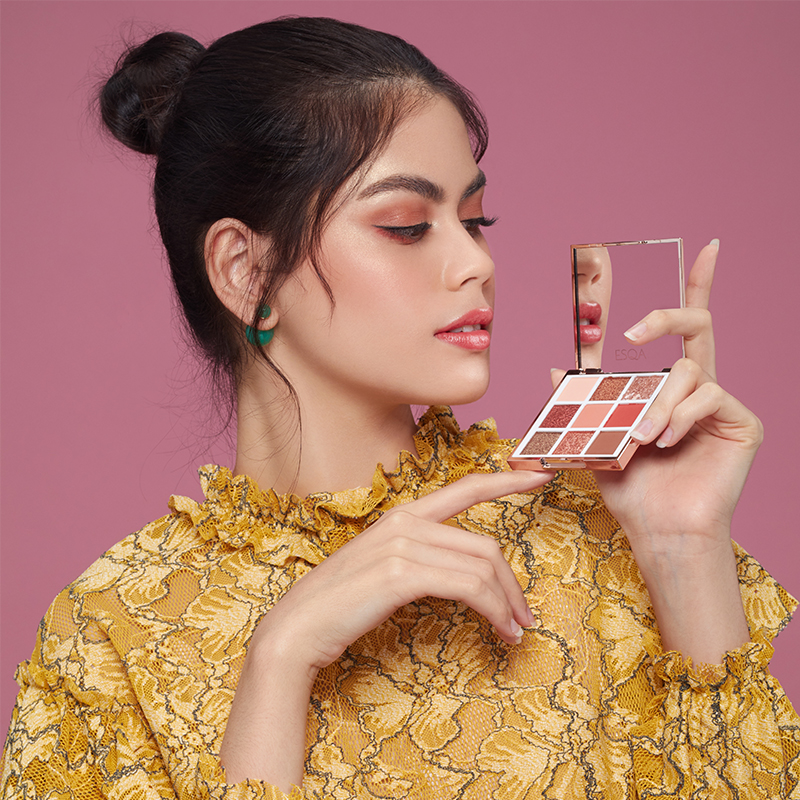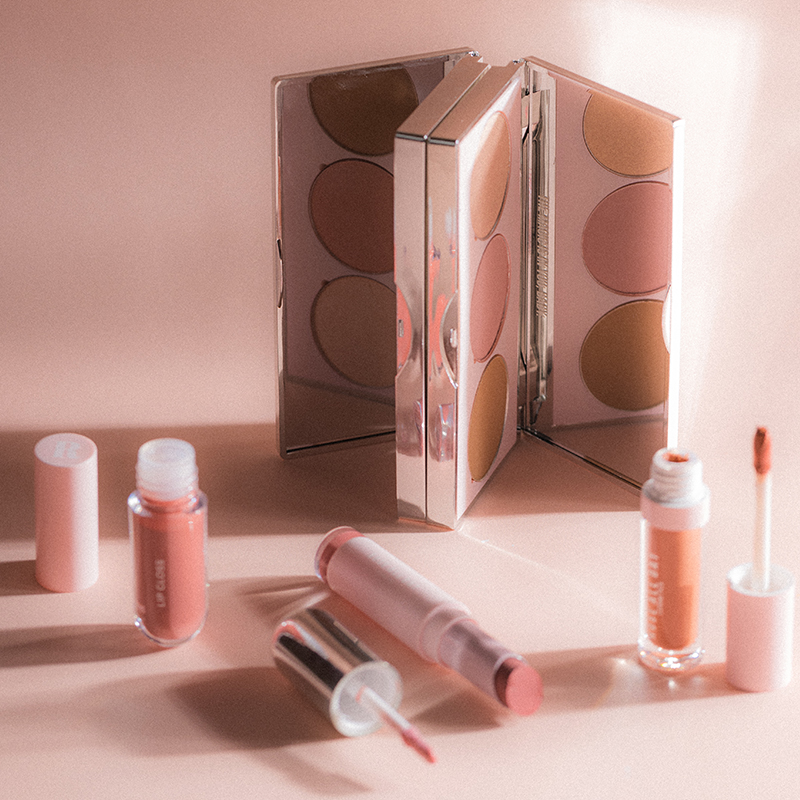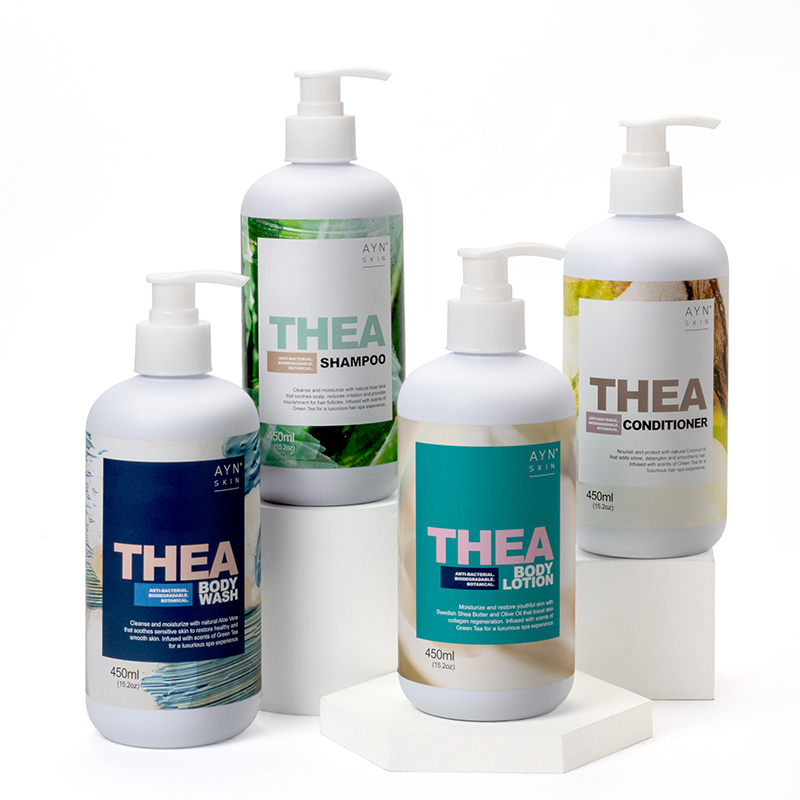The shift where beauty ideals and Muslim representation intersect range from minor to monumental: Malaysian singer Yuna in her signature turban emblazoned on New York’s Time Square billboards, Somali-American model Halima Aden redefining standards as a Muslim in the Miss Minnesota USA Pageant (she opted for a burkini over swimwear), and Ikram Abdi Omar making fashion news for being the first hijabi in a Burberry campaign.
You only need to look to the 240 million Muslims in Southeast Asia, and the global Muslim population that’s likely to increase 80 per cent by 2050. The halal industry itself was estimated at US$61 billion in 2017, and is expected to increase to S$122 billion by 2023, according to the DinarStandard’s State of the Global Islamic Economy Report 2019/20. The global halal cosmetics market is also expected to reach approxmiately S$70.85 billion by 2025, according to a report by Grand View Research.
What used to be beyond the ebb and flow of the mainstream is now the epicentre: halal beauty is booming.
There’s nothing new about the term ‘halal’—it denotes what’s ‘permissible’ within Islam, more commonly to do with Islamic dietary laws and food. But what does halal mean exactly in beauty?
What is halal beauty?
Halal beauty encompasses everything from the ingredients, manufacturing, packaging and storage that are free from (and do not come into contact with) animal-derived ingredients, alcoholic beverages and its derivatives, blood, carrion, and contents that are harmful. This includes ensuring that the products are processed with instruments that have not been contaminated with impurities.
Halal certification is granted by the authority in each country—in Singapore it’s the Islamic Religious Council of Singapore (MUIS), for Malaysia the Department of Islamic Development Malaysia (JAKIM), and in Indonesia, The Indonesian Council of Ulama (MUI). Because there are multiple layers and steps involved, gaining the halal stamp of approval can be a lengthy (yet rewarding), process.
Why you don’t have to be Muslim to enjoy halal beauty
Historically, though, ‘halal beauty’ in the region seemed to be a confined modality, with brands feeling a little too traditional, marketed to the very devout, or laden with a religiosity that came across as exclusionary.
On the contrary, having halal certification is an industry standard that’s actually inclusionary and relevant to all consumers regardless of faith. It also reflects the diverse and visible lives of Muslims and it’ll only take a short scroll through social media for cascades of videos of hijabis being hype (while pious), flaunting their #MOTD (stylish scarf included), and hopping onto (Islamic and secular) meme trains.
Southeast Asian halal beauty brands to know
Vogue Singapore has scoured the region for the Southeast Asian halal beauty brands that speak to Muslims of now. From customised skincare serving Gen Z realness, to repopularised lipstick bullets that make your pout pop, and all-natural bath care that’ll elevate your self-care, here are the top-to-toe Asian halal brands worthy of your top shelf.
Base (Indonesia)

What else is closer to you than your skin? Everyone’s skincare needs are specific and so personal, yet our choices are rife with one-size-fits-all products and the lack of time to research what actually works. By also observing the sheer hugeness and diversity of the Indonesian archipelago, Yaumi Fauziah Sugiharta and Ratih Permata Sari saw the need to cut through the noise, and they co-founded Base in March 2019.
“Indonesia is a very diverse country with so many islands, cities where the climates and humidity levels are different between one another… not to mention the diversity from the ethnicities we have—around 633 ethnic groups—which makes us have different skin tones genetically. The cities we live in also affect our skin’s needs,” says Sugiharta.
Base skincare removes the guesswork of finding products suited to your skin through a clever questionnaire and algorithm, tailoring formulas that are customised for you. “We tackle pain-points in finding suitable skincare for [diverse skin] by utilising technology and algorithms. This personalised skincare matches your skin types, skin goals, and your lifestyle with vegan, halal, and ECOCERT ingredients that will work wonderfully with your skin,” Sugiharta continues.

Their offerings? Back-to-basics products: cleanser, toner and moisturiser (in eco-friendly ceramic bottles, no less) with formulas that are free of SLS, phthalates, parabens, artificial perfumes, and artificial colorants. Their website also offers a Gen Z’s dream: think pops of graphics, shots of diverse, beautiful Base Friends (Base was “born to defy Indonesia’s beauty standards” according to its co-founders), and a skincare quiz that precedes your purchase. It takes around 5 minutes to complete, and it asks about your skin type, your concerns, and your lifestyle.
The algorithm then analyses your answers and picks from over 100 active plant-based ingredients to put together a personalised formula for you. The order (we loved our moisturiser’s non-stickiness, and skin had a comfortable glow just moments after) comes packaged with cute stickers, a personalised card with your skincare ID, and a cloth dustbag with the words “You Are Unique. So Is Your Skin.” The only appropriate response? “Yassss.”
Price Range: From $9.26 for Personalized Cleanser, $15.03 for Personalized Toner, and $17.86 for Personalized Moisturizer
Halal Status: Uses halal Ingredients, halal certification in progress
Shipping: All over Indonesia, international delivery available upon request
Esqa (Indonesia)

The past decade has seen a refocus by halal brands to move from the external to what really matters: ingredients. This was something that Cindy Angelina and Kezia Toemion observed when they lived in Los Angeles for 8 years before moving back to Indonesia, and they co-founded cosmetics line Esqa. They came to market in June 2016 as the first vegan cosmetics brand in Indonesia, looking to fill a major gap.
Their tale of two cities was a convergence of the nowness of LA with the locality and needs of their home country and region, leading to a line that was halal-certified. “At the time, there was not a lot of emphasis on ingredients. But demand for halal products was very high because a majority of our population consider halal-certified products when it comes to their buying decisions,” say the duo. “Having a halal certificate is very important for beauty brands, because healthy ingredients are now one of the top considerations for customers.”

The result: make-up products that deliver on quality, don’t break the bank, and are formulated without harmful ingredients. “We are halal-certified, cruelty-free, and we don’t use harsh chemicals such as parabens, phthalates, triclosan, sodium lauryl sulfate, and gluten,” share the co-founders.
Price Range: $10 – $30
Halal Status: halal-certified
Shipping: Ships all over Indonesia. For Malaysia, available at Watsons online and offline, and Lazada Mall. Shipping to Singapore will commence Sept 2020
Rosé All Day (Indonesia)

Any beauty-lover’s happy pill would be a gorgeous lip shade. Rosé All Day’s lip glosses will brighten anyone’s day with its cute, fun pill packaging, yet the brand means serious business. “Ever since our launch, we disrupted the beauty industry by breaking the trends in Indonesia and introducing innovative products to the market,” Tiffany Danielle, Co-Founder of Rosé All Day Cosmetics, tells Vogue Singapore.
Offering fuss-free, multifunctional and skin-loving beauty products, Rosé All Day is an indie brand that has advocated “no make-up” make-up. When the trend was long-wearing and transfer-proof, they wanted to stay ahead of the curve. “With our first product, we stayed true to our brand and released our lip and cheek duo—a multifunctional lipstick for the eyes, cheeks and lips. With our lip and cheek duo, we once again popularised bullet lipsticks in the market,” says Danielle.
Yet, at the outset, they weren’t halal–certified. However, the sheer pull of customer requests was huge. “When we first launched our brand, we were not halal-certified. However, we quickly learned how important it was as a beauty brand to hold a halal certification especially in Indonesia, which has the largest Muslim population in the world,” explains Danielle. They then worked with third-party manufacturers to get halal-certified.

If you’re eternally struggling with wanting to play with make–up and have great skin, you can do both. Rosé All Day also introduced the concept of skincare-make-up hybrids which meant that beauty-lovers could do their #MOTD every day, in every way, without compromising their skin. “At Rosé All Day Cosmetics, we believe in creating beauty products that are good for the skin. Thus, we take great care in selecting the hero ingredients that go into our beauty products,” says Danielle. “All of our products are halal-certified, clean beauty and cruelty-free. We have since been the go-to premium beauty brand that offers the highest quality products with an affordable price tag.”
The clear best-sellers are their complexion-based products, their foundation and compact powder will impart that next-to-nothing look. Other stars include the lip mousses, which go on as light as powder but stay matte on lips without any cracking. Their Aloe-Ha Aloe Vera Gel is also a natural elixir for anything that ails you: wear it on your face for a gorgeous glow, smoothen into your hair, use on your nails and cuticles, or just all over (ashy elbows, banished). It’s lightweight and doesn’t leave behind any stickiness.
Price Range: $6.50 – $22
Halal Status: halal-certified
Shipping: Ships to Singapore, Malaysia, and Indonesia
Ayn Skin (Singapore)

Ayn Skin was born as a response to the clean beauty movement and out of the desire to deliver products that will look good in any beauty shelfie while offering plant-based ingredients. “We may be a young brand but we have big ambitions!” says Shanna Ng, co-founder of The Good Skin Company, the parent company of Singapore-based Ayn Skin.
Ayn Skin offers bodycare, haircare and hand sanitisers with a focus that whatever goes into the bottles are of the highest quality—no compromises. With no colourants, mineral oils, sulfates and parabens in sight, the ingredients are also biodegradable, cruelty-free, organic, vegan, and halal. “We wanted to create a company that embraces healthy, safe and quality-regulated products that are ultimately good for the skin,” Ng tells Vogue Singapore.
With the emphasis on great ingredients, getting halal-certified seemed like a natural progression. “Clean beauty products often claim to be certified cruelty-free, organic and vegan as a standard industry practice. We wanted to go one step further by enhancing quality assurance right from the manufacturing phase through regulatory adherence of halal certification. This ensures stringent hygienic production procedures from sourcing to packaging and the use of authentic raw ingredients,” says Ng.
Their mantra, ‘Hear Your Skin’, is answered via affirmations of what each product can offer you as you scroll through their website. For us, the Isla Body Wash called to us (in particular, the deep fig scent), and the Thea Body Lotion went on light and absorbed on contact. The Thea Shampoo and Conditioner combo also resulted in lighter, bouncier locks that were softer and easier to manage. If you are easily sensitised, though, the products do contain fragrances.
The brand also aims to give back where it can, committing to contribute a portion of sales to established local and global charitable causes. And yet again, the brand enjoyed the inclusionary knock-on effect that halal beauty branding can give. “Our non-Muslim customers were pleasantly surprised when they realised halal-certified products are not just a faith-based practice but actually provide greater assurance for quality products, which leads to better skin health. Everyone benefits!”
Price Range: from $16.90
Halal Status: The Thea range is halal-certified, while the remaining bodycare range is awaiting certification.
Shipping: Retailing in Singapore but also delivers to Malaysian and Indonesian customers on demand.
So.Lek (Malaysia)

Growing up in Southeast Asia, any impressionable young woman would have probably formed a bond with established beauty houses that could whisk her to far-flung places with just a swipe of lipstick or a swish of perfume. Sure, these are transformative experiences, but here lies the disconnect, begging the questions: “Why doesn’t anybody in the campaigns look like me?” and, “Why can’t I take pride in my own culture and identity, rather than something so distant?”.
Dahlia Nadirah Juhari and her brother Luqman Hakim Juhari set out to create a Malaysian make-up brand in 2016 after seeing an opportunity to create lip creams for the local scene. From there, SO.LEK Cosmetics was born—a local-made, halal-certified cosmetics brand that also aims to promote Malaysian tradition and heritage. The brand successfully does so, with their branding (the logo is a tribute to their grandmother who wore traditional eyeliner in her lifetime), and naming every single product according to local folklores, local dances, native Malaysian flowers, fruits, and music instruments.
Wearing Malaysian pride as a badge of honour, alignment was easy for this brand that’s steeped in the country’s identity: “Solek” is the Malay word for “cosmetics”, and the sibling duo had always used the jibe, “So? Lek, lah!” (which roughly translates to “So, just relax!”) with each other. Their transparency and connection with their customers and doing business with heart also solidified customer loyalty. “We reply to comments and DMs, no matter how many,” says Nadirah. “In addition, we have been actively donating RM1 for each product sold to different bodies as part of our CSR effort,” she continues.
Yet, the proof lies in the products, which are much-loved and deliver on quality. “When we first started, our Gincu lipcream was a hit among the customers. We took pride in the fact that they are olive-oil based.” Their best-sellers are still their liquid lipsticks: the shade Ledang is the most unique nude yet, and the formulation never dries out lips. The next favourite would be Alis (their brow pencil that can subtly shade any arch) and Celak (their eyeliner, which guarantees a flawless cat-eye flick, even for shaky hands!).
Other picks: SO.LEK’s mascara, blush products, and recent expansion into skincare. “Another best-seller is our nail polish range, Kilat. They’re breathable, water-permeable and peelable. A crowd-favourite is Markisa, a guava pink shade,” says Nadirah. Things are looking up, especially because of their halal status. “The market is not only limited to the Muslim community. We have been approached by non-Muslims because they feel that our products are without any doubt, safer and cleaner to use, which is the essence of halal.”
Price Range: $9.50 – $22.50
Halal Status: halal-certified
Shipping: Ships to Malaysia, Singapore, and Indonesia





